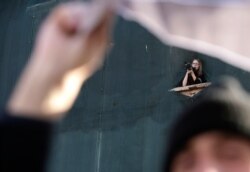The leading journalism school in North Macedonia has not enrolled any new students for the past five years.
In 2019, only 12 students were enrolled in journalistic studies in the Balkan country, Barbara Cochran, director of the Washington Program at the Missouri School of Journalism, said.
"Having young people not be interested in journalism as a career in North Macedonia is really a shame and a setback for democracy," she said in an interview with VOA's Macedonian Service.
The decline was confirmed by the International Research and Exchanges Board (IREX) in its latest report on Media Sustainability. IREX is an international, nonprofit organization that specializes in global education and development.
"Journalism is an essential pillar of democracy. If we do not have journalists, citizens have no way to get independently verified information that they can use to make the decisions they need to make in a democracy," Cochran said.
The development is particularly disconcerting as Macedonian teens were instrumental in spreading false information online during the 2016 U.S. presidential election campaign.
A 2018 report by Human Rights Watch (HRW) said journalists across the Balkans in states such as Kosovo, Bosnia, Croatia and others remain at risk for physical attack. Additionally, it said poor pay is discouraging people from entering the profession.
It's a different story at some U.S. universities, reports Inside Diversity magazine. It quotes several professors who say they're seeing a "Trump bump" in terms of recovering enrollment numbers. (Trump refers to U.S. President Donald Trump.)
Cochran said media leaders need to think about how to make journalism a more attractive career that can sustain professionals.
"Pay them enough. Give them the kinds of working conditions that will allow them to take a rest when they have been working very hard. Protect them from harassment, which unfortunately is becoming more and more common for journalists," she said.
Cochran also said violence against journalists is a disturbing trend, and not limited to just the Balkans. She said such actions further discourage young people from choosing careers in journalism.
"Journalists need to help each other, to not attack each other, to work in solidarity with each other. One thing that I would mention is that here in the U.S., we are working to create a monument to journalists who have been killed while pursuing the truth. That is something that we mean, to honor not just American journalists but journalists from all over the world," she said.
"Facebook is playing a very troubling role right now with the kinds of things they are allowing to circulate that are not necessarily true," Cochran said. "It is very important to have free speech, but there still has to be standards and above all, value on the truth in what's being communicated."
Tara Susman-Peña, a senior technical adviser in information and media practice at IREX, told VOA's Macedonian Service that false news on Twitter travels almost six times faster than the truth. Another reason, she said, for a decline in interest in journalism.
"I would say that it's really an important moment for Macedonia to think really seriously about strengthening the entire information system," she said. "If the politicians are increasing the verbal attacks and if there is an increase in physical attacks, that can make it all the less likely that you will get interest from youth to join and become journalists."
Moreover, Susman-Peña said it could have a serious impact on democracy.
"One way to restore the interest of young people is to keep the media up-to-date with technological change," she said. "Journalism should not get lost on social media feeds, but you need to be both thoughtful and innovative and to speak the right language to appeal to youth."
Both Cochran and Susman-Peña said traditional media needs to embrace digital innovation yet ensure that online media adheres to journalistic standards and qualities.






